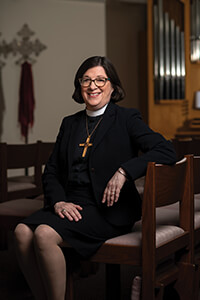Time to get to know each other
January 24, 2016
Sometimes I just don’t get us. We are the least likely of all people to speak enthusiastically about our church. I don’t know if it is some cross-cultural Lutheran modesty that compels us to hide our light under a bushel, but the effect is that the ELCA is one of the best kept secrets — from ourselves.
Other people in this country and around the world value who we are as a church and the work we do in Jesus’ name. Recently I was in the Zaatari refugee camp in Jordan observing the work of the Lutheran World Federation. The Syrian refugees knew what is Lutheran. Our colleges and universities affirmed the value of a Lutheran education — our tradition of free inquiry, vocation and service to the neighbor. Chris Kimball, president of California Lutheran University, Thousand Oaks, proudly states that “Lutheran” is the school’s middle name. Non-Lutheran students attending the Lutheran Theological Seminary at Philadelphia refer to the school simply as “Lutheran.” Lutheran Services in America is the largest social service-providing entity in the country, serving 1 in 50 Americans. I bet most of you reading this column didn’t know that.
Of course I understand that our primary identity is Christian and that baptism doesn’t make us Lutheran, it makes us part of the body of Christ. But the Lutheran witness to the gospel has something important and distinctive about it that is valued by other Christian and religious traditions, and by the secular world as well. Other people see it. We don’t.
I’ve been thinking about this a lot lately. Many sociological explanations for this probably could be cited: the erosion of trust in large institutions, our culture of individualism, increased secularization — the list could go on. But here’s my theory: We don’t know who we are and don’t know each other.
Kenn Inskeep, director for ELCA Research and Evaluation, notes that the ELCA’s predecessor church bodies had a strong and widely shared Lutheran identity in the 1950s. There was a strong Lutheran theological identity. Theology was primarily the domain of the clergy, but many lay members knew the basics and could recite from Martin Luther’s Small Catechism. And people knew of and supported the agencies and institutions of the church.
Before you worry that I’m going to get all Ozzie and Harriet Nelson on you, I’m not advocating a return to the ’50s. There were many things in our church and in our country in those years to which I would never retreat. My point: We have lost something that helped us understand God and the world and that connected us to each other.
This isn’t the first time the Lutheran movement needed a little shoring up. In 1527 and 1528, Luther took part in the Saxon Visitation, an assessment of congregations and clergy in the German state of Saxony. He wrote: “The deplorable, wretched deprivation that I recently encountered while I was a visitor has constrained and compelled me to prepare this catechism, or Christian instruction, in such a brief, plain and simple version. Dear God, what misery I beheld! The ordinary person, especially in the villages, knows absolutely nothing about the Christian faith. … As a result they live like simple cattle or irrational pigs and, despite the fact that the gospel has returned, have mastered the fine art of misusing all their freedom” (preface to the Small Catechism).
Luther also piles on pastors and bishops with stronger language. His Small and Large Catechisms were written, in part, to address this need.
We are going to have our own Saxon Visitation in a process requested by the ELCA Church Council. We are going to have a churchwide conversation about the priorities and future direction of this church. When I say we, I mean all of us — members, congregations, synods, rostered, lay, seminaries, colleges and universities, agencies and institutions, bishops, churchwide staff — all of us.
But we can’t talk about priorities and future directions if we don’t know who we are or what we do. We are developing a tool kit that will help us all engage in the same conversation. I’m hopeful that, with the Spirit’s guidance, we will come up with something terrific. I’m equally hopeful that we get to know each other and come together as a church.

